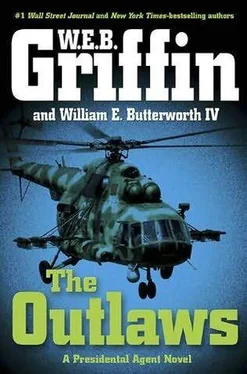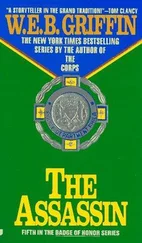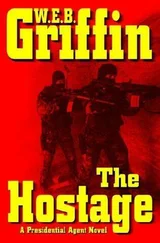W Griffin - The outlaws
Здесь есть возможность читать онлайн «W Griffin - The outlaws» весь текст электронной книги совершенно бесплатно (целиком полную версию без сокращений). В некоторых случаях можно слушать аудио, скачать через торрент в формате fb2 и присутствует краткое содержание. Жанр: Триллер, на английском языке. Описание произведения, (предисловие) а так же отзывы посетителей доступны на портале библиотеки ЛибКат.
- Название:The outlaws
- Автор:
- Жанр:
- Год:неизвестен
- ISBN:нет данных
- Рейтинг книги:3 / 5. Голосов: 1
-
Избранное:Добавить в избранное
- Отзывы:
-
Ваша оценка:
- 60
- 1
- 2
- 3
- 4
- 5
The outlaws: краткое содержание, описание и аннотация
Предлагаем к чтению аннотацию, описание, краткое содержание или предисловие (зависит от того, что написал сам автор книги «The outlaws»). Если вы не нашли необходимую информацию о книге — напишите в комментариях, мы постараемся отыскать её.
The outlaws — читать онлайн бесплатно полную книгу (весь текст) целиком
Ниже представлен текст книги, разбитый по страницам. Система сохранения места последней прочитанной страницы, позволяет с удобством читать онлайн бесплатно книгу «The outlaws», без необходимости каждый раз заново искать на чём Вы остановились. Поставьте закладку, и сможете в любой момент перейти на страницу, на которой закончили чтение.
Интервал:
Закладка:
"Why don't I believe that, Aloysius?" Torine asked softly.
"Probably because you're an old fart like me, and have learned that when things are as black as they can possibly get, they invariably get worse." [TWO] U.S. Army Medical Research Institute Fort Detrick, Maryland 0905 4 February 2007 The declaration of a Potential Level Four Disaster at Fort Detrick by Colonel J. Porter Hamilton, MC, caused a series of standing operating procedures to kick in-something akin to a row of dominoes tumbling, one domino knocking over the one adjacent, but in this instance damned faster.
When Master Sergeant Dennis called the post duty officer, he actually called the garrison duty officer. On coming to work for Colonel Hamilton, Dennis had quickly learned that the colonel often had trouble with Army bureaucracy and that it was his job to provide the colonel with what he wanted, which often was not what he asked for.
The garrison duty officer immediately expressed doubt that Master Sergeant Dennis was actually asking for what he said he was.
"A Potential Level Four Disaster? You sure about that, Sergeant?"
"Yes, sir. Colonel Hamilton said he was declaring a Potential Level Four Disaster."
The garrison duty officer consulted his SOP dealing with disasters, and checked who was authorized to declare one.
There were three people who could on their own authority declare a Potential Level Four Disaster: the garrison commander, Colonel J. Porter Hamilton, and the garrison duty officer.
"Let me speak to Colonel Hamilton, Sergeant," the garrison duty officer said.
"He's on his phone, Major. Now, do you want to send a Level Four van over here, personnel in Level One hazmat suits, or should I call for it?"
"You have that authority?"
"Yes, sir. I do. And I have authority to have Level Four BioLab Two opened and on standby. You want me to do that, too, sir?"
"Why don't you do that, Sergeant, while I bring the garrison commander up to speed on this. And, Sergeant, see if you can have Colonel Hamilton call her."
"Yes, sir," Master Sergeant Dennis said.
The duty officer called the garrison commander.
"Major Lott, ma'am. Ma'am, we seem to have a problem."
"What kind of a problem?"
"Ma'am, Colonel Hamilton's sergeant just called and said the colonel wanted to declare a Potential Level Four Disaster."
There was a pause. Then the garrison commander said, "Let me make sure I understand the situation. You say Colonel Hamilton's sergeant called and told you Colonel Hamilton wants to declare a Potential Level Four Disaster? Is that it?"
"Yes, ma'am. That's it. I thought I'd better bring you up to speed on this, ma'am."
The garrison commander thought: What you were supposed to do, you stupid sonofabitch, was sound the goddamned alarm sirens, get a Level Four van over to Hamilton, get a Level Four BioLab on emergency standby and then-and only then-call me.
And you're a goddamn major?
Jesus H. Christ.
She said calmly: "Listen carefully. What I want you to do, Major, is first sound the alarm sirens. Then send a Level Four van to Colonel Hamilton's laboratory, and when you've done that, get a Level Four BioLab on emergency standby. Got all that?"
"Yes, ma'am."
"Then do it," the garrison commander said, and broke the connection.
Major Lott raised the cover of the alarm activation switch and then pressed on the switch. Sirens all over began to howl.
He then consulted the standing operating procedure to see what else was required of him to do-thus knocking over the first of the dominoes.
The provost marshal was notified. The first thing listed on his SOP was to lock down the fort. Nobody in. Nobody out. He did so. The second thing on his list was to notify the garrison medical facility to prepare for casualties. The third thing listed was to notify the Secret Service detachment on the base. He did so, and then continued to work down his list.
The first thing on the Secret Service Detachment SOP was to notify local law enforcement agencies. With Fort Detrick equidistant between Washington, D.C. (forty-five miles), and Baltimore, Maryland (forty-six miles), there was a large number of law enforcement agencies in that area, each of which was entitled to know of the problem at Fort Detrick.
The Secret Service agent instead first called his special agent in charge at the Department of Homeland Security at the Nebraska Avenue complex in the District of Columbia. He told him about the Potential Level Four Disaster, but had to confess that was all he knew.
"I'll handle it," the SAC said.
The Secret Service agent began calling the numbers on his list of law enforcement agencies to be notified.
The SAC at Homeland Security attempted to contact the secretary of Homeland Security but was told he was in Chicago with Mayor Daley. He then got the assistant secretary for enforcement on the telephone and told him about the Potential Level Four Disaster at Fort Detrick.
"I'll be damned," he said. "I'll handle it."
He contacted the garrison commander on a hotline.
"Assistant Homeland Security Secretary Andrews, Colonel," he said. "I understand you've got a little problem over there."
The garrison commander had by then spoken with Master Sergeant Dennis, who had told her about the container that had arrived with the morning FedEx shipment.
When she had told Andrews this, he said, "I'll take immediate action."
Andrews then called the SAC back, told him to get on the horn to his people at Detrick, and have them grab the container and not let anybody else near it.
"How's the quickest way for me to get there?" the assistant secretary asked.
"It would probably be quicker in one of our Yukons than trying to get a chopper, Mr. Secretary. I can have one at your door in ninety seconds."
"Do it."
Five and a half minutes later, a black Secret Service Yukon-red and blue lights flashing from behind its grille and with another magnet-based blue light flashing on the roof-skidded to a stop in front of the main building and picked up Assistant Secretary Andrews. The SAC was in the front seat, where the assistant secretary preferred to ride.
Andrews thought: Ninety seconds, my ass.
That took five minutes plus, and we need to roll.
"Get in the back," he said.
Only then did the assistant secretary remember he had had another option. He could have told the SAC to get out.
But it was too late. He took a seat in the second row and, siren screaming and lights flashing, they were on their way to the Potential Level Four Disaster at Fort Detrick. [THREE] Office of the Presidential Press Secretary The White House 1600 Pennsylvania Avenue, N.W. Washington, D.C. 1020 4 February 2007 There were a half-dozen television monitors mounted on the wall of John David "Porky" Parker's office, one for each of the major television networks, and the other three for the "major" cable news programs.
The sound of only one was on, the volume low but on.
Porky Parker was more or less addicted to watching/listening to Wolf News. Not because he liked it, but the opposite. He hated it. Wolf News gave him the most trouble. It seemed to be dedicated to the proposition that all politicians, from POTUS down, were scoundrels, mountebanks, and fools, and that it was Wolf News's noble duty to bring every proof-or suggestion-of this to the attention of the American people.
The problem was compounded for Porky by the fact that the people of Wolf News were very good at what they did, and with great skill went after the scoundrels, mountebanks, and fools regardless of political affiliation.
Wolf News used the fourth and final part of Gioacchino Antonio Rossini's (1792-1868) "William Tell Overture" to catch people's attention whenever there was "breaking news." Most people recognized the music as the theme for the Lone Ranger motion picture and television series.
Читать дальшеИнтервал:
Закладка:
Похожие книги на «The outlaws»
Представляем Вашему вниманию похожие книги на «The outlaws» списком для выбора. Мы отобрали схожую по названию и смыслу литературу в надежде предоставить читателям больше вариантов отыскать новые, интересные, ещё непрочитанные произведения.
Обсуждение, отзывы о книге «The outlaws» и просто собственные мнения читателей. Оставьте ваши комментарии, напишите, что Вы думаете о произведении, его смысле или главных героях. Укажите что конкретно понравилось, а что нет, и почему Вы так считаете.











